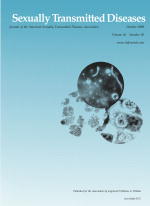Resumen
Objectives: To determine the prevalence of human immunodeficiency virus (HIV), Chlamydia trachomatis (CT), and Neisseria gonorrhoeae (NG) among immigrant female sex workers (FSW) according to their geographic area of origin and identify possible risk factors independently associated with current infection with CT and/or NG. Study Design: Cross-sectional study of 357 FSW in Catalonia in 2005. Information on sociodemographic and sex work characteristics, use of alcohol and drugs, sexual practices, and the use of social and health care services was collected. Oral fluid and urine samples were collected to determine the prevalence of HIV and CT/NG, respectively. Factors independently associated with CT/NG were assessed using multivariate logistic regression models. Results: A total of 36.4% of women were from Eastern Europe, 34.5% from Latin America, and 29.1% from Africa. Overall CT and NG prevalence were 5.9% [95% confidence interval (CI): 3.7-8.9] and 0.6% (95% CI: 0.1-2.0), respectively. No differences were observed by geographic origin. Three African women were HIV positive (overall HIV prevalence was 0.8%, 95% CI: 0.2-2.4). In multivariate analysis, younger age and unprotected sex with clients were associated with the presence of CT/NG. Conclusions: The prevalence of sexually transmitted infections among FSW in Catalonia was lower than in other European countries. Even though the prevalence of HIV was only 0.8%, it could increase in the future given the high vulnerability of these women and their wide geographic mobility. It is necessary to continue with the work carried out by nongovernmental organizations (harm reduction programs, outreach programs, and safe sex workshops) as well as to facilitate the access to health centers, especially for the youngest women. (Resumen extraído del artículo)






